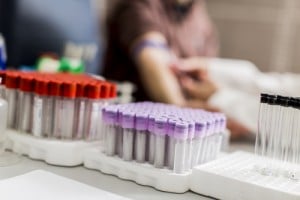Kidney Function
The kidneys serve a multitude of different functions in the body. They help to regulate glucose levels in the blood, filter out waste products caused by the metabolizing of food, and regulate blood pressure, electrolytes, and other fluids. Kidney failure, therefore, can negatively affect many different parts of the body. The renal system, of which the kidneys are a part, controls urine output. Reduced urine output is one of the first signs of kidney failure. Kidneys are vital organs and it is important to monitor their health. This can be done through blood tests and by understanding what type of symptoms may appear if the kidneys are not functioning optimally.
Signs and Symptoms of Kidney Failure
- Reduced or no urine output
- Nausea or vomiting
- Reduced interest in food
- Swelling of the legs and feet
- Abdominal-level back pain (where the kidneys are located)
- Feeling anxious or restless
- Feeling overly fatigued
- Shortness of breath
- Confusion or disorientation
Knowing the signs and symptoms related to kidney failure may help individuals to identify a kidney problem. However, by the time these symptoms start to appear the kidneys have been at below optimal functioning for quite a while. It is much better to monitor kidney function with a blood test that can detect abnormalities before outward symptoms appear. A kidney function test should be part of one’s annual checkup, but some doctors do not order the tests unless they believe that the patient is at high risk.
Causes of Kidney Failure
Failure of the kidneys can be caused by an acute circumstance, such as direct damage to the kidney, or may be caused by a chronic health issue, like diabetes. The kidneys need constant blood flow to function as they should. Conditions that hinder blood flow can quickly cause kidney damage. Sometimes, if an infection in the body is left untreated, the immune system will be overworked – causing inflammation in the body. This inflammation can shut down kidney functioning. Another cause of kidney failure can be due to medications. Anti-inflammatory drugs, such as ibuprofen, poison the kidney. If too much ibuprofen is present in the body at once, the kidneys can completely shut down. Another common class of medication of which to be aware is diuretics. Low fluids and dehydration can also cause kidney failure.
Treatment and Prevention Options
Prevention of kidney failure is always favorable to treatment of kidney failure. Prevention methods are especially important to individuals with chronic diseases such as hypertension and diabetes that can place a constant strain on the kidneys. In these cases diet is a huge part of prevention. Changing one’s diet can help keep blood sugar levels and blood pressure under control so that the kidneys do not have to go into overdrive to bring the levels back to a normal range. These individuals should also routinely monitor their kidney functioning with blood tests.
If prevention fails, the next best thing is early detection. Once kidney failure is identified the decline can sometime be stopped, but the individual may never regain full functionality. If there is complete failure of kidney functioning, the only options are dialysis or a kidney transplant– and dialysis is not a long-term solution.
Kidney Function Blood Tests
When the kidneys are not functioning properly the body cannot get rid of waste products, and these waste elements start to build up in the body. Fluids and electrolytes start to build up as well, and blood pressure rises. Without early detection kidney failure can be hard to treat, and if left too long it can be fatal. The best way to measure kidney function is through blood tests that measure the different fluids that the kidneys are supposed to regulate. For example, a creatinine blood test is often used to test for kidney failure. Creatinine is a waste that is present in both blood and urine. If the kidneys are working properly, one would expect to see low level of creatinine in the blood. High levels of creatinine in the blood would indicate that the kidneys were not filtering waste products out of the body.
Blood tests are a simple and easy way to monitor kidney health. Healthy individuals with no overt risk of kidney failure should have a kidney function blood test performed at least once every five years. Individuals who are at a higher risk, such as those with diabetes, should be tested at least once yearly. Other risk factors may require more frequent testing. The earlier one knows about the problem, the earlier the damage can be stopped.


